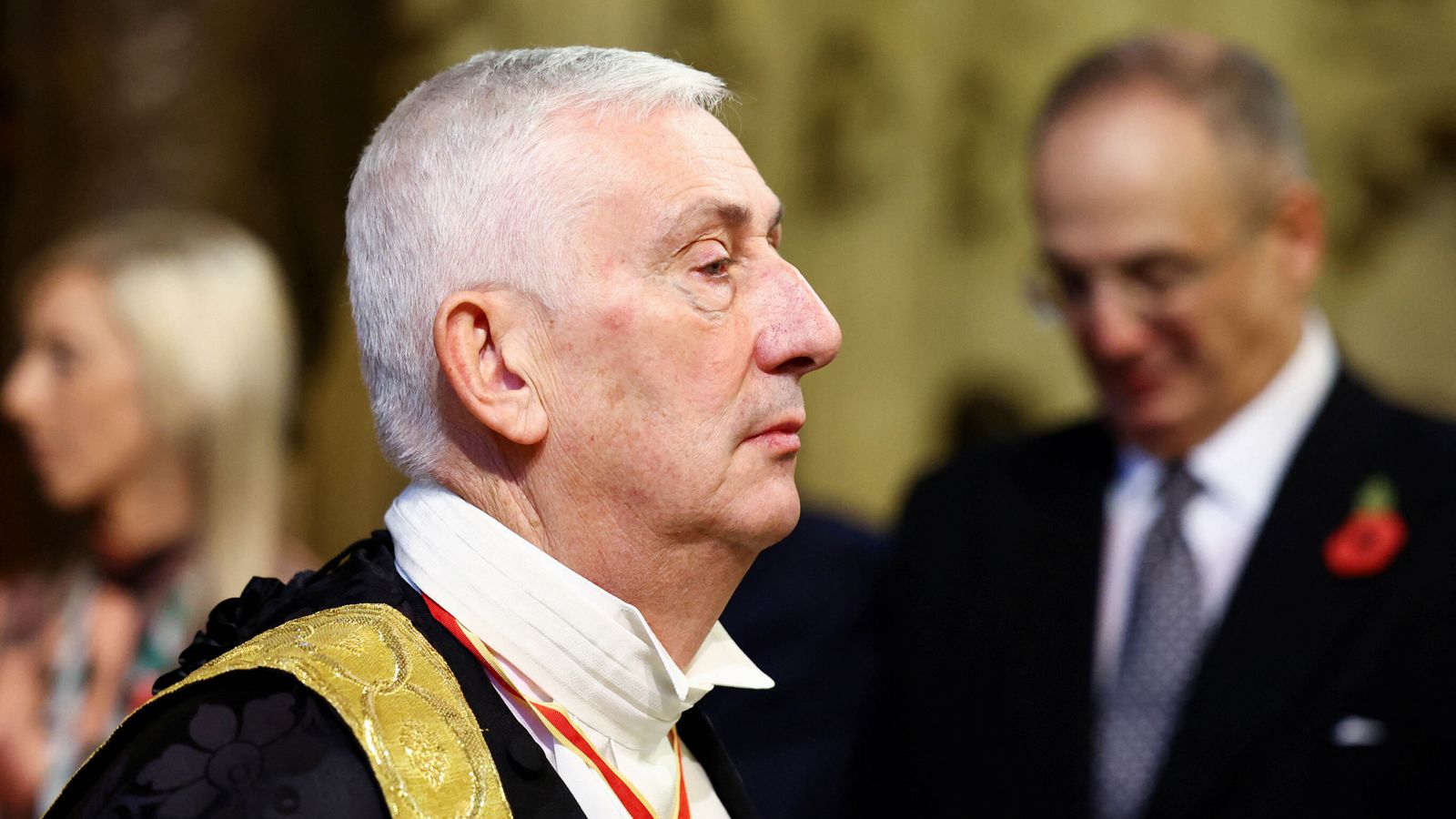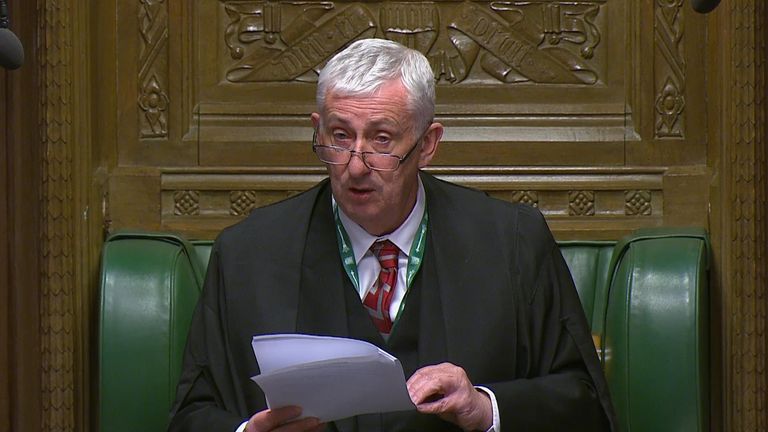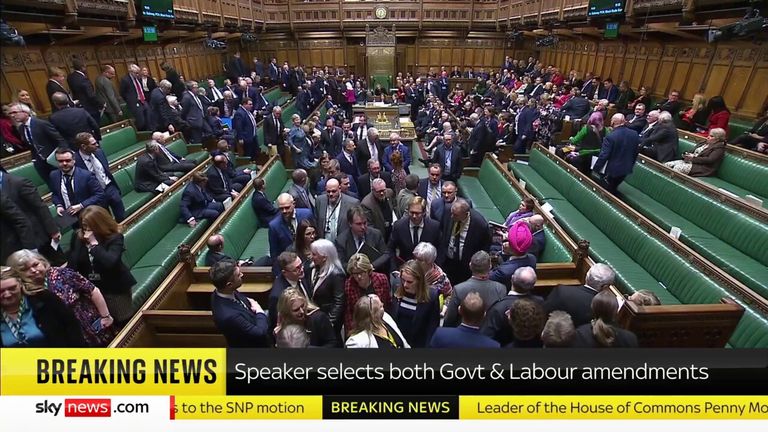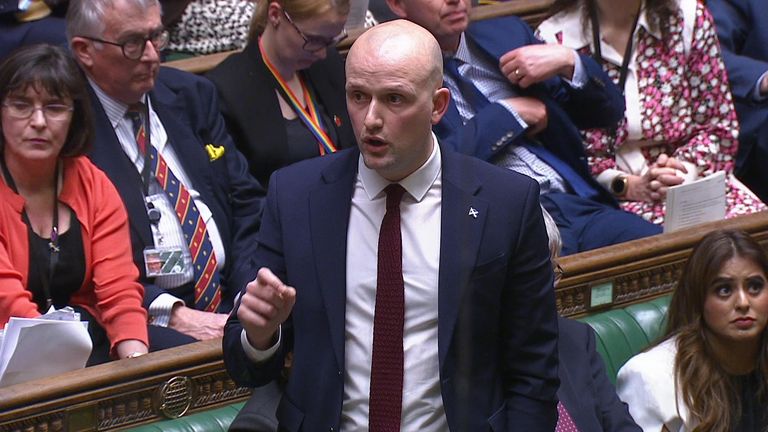Speaker clinging on to job as 33 MPs sign no-confidence motion after Commons Gaza vote descends into row


Commons Speaker Sir Lindsay Hoyle has apologised to MPs after the chamber descended into chaos around a motion calling for a ceasefire in Gaza.
Wednesday was designated as an opposition day for the SNP, which chose to debate the Israel-Hamas war – and sought to persuade MPs to back its calls for an immediate halt to the fighting.
But a controversial decision from Sir Lindsay to allow a Labour amendment to be put to the House led to an uproar from Tory MPs – and eventually saw the government pledging to “play no further part” in proceedings, as well as the SNP not even getting to vote on its original proposal.
After Conservative and SNP politicians stormed out of the chamber in protest, Sir Lindsay returned to the Commons to face his critics, apologising for “how it all ended up” and saying he took “responsibility” for his actions.
But SNP leader Stephen Flynn said he would “take significant convincing” that the Speaker’s position was “not now intolerable”.
And 33 MPs from both his party and the Tories have now signed a no-confidence motion in Sir Lindsay – not enough to oust him yet, but a motion that could gain traction in the coming days.
Politics live: Speaker sparks fury with amendments decision
Today’s debate was set to be the conclusion of days of drama over whether Labour would change its position on the conflict in the Middle East.
The party initially supported the government’s stance, calling for a pause in the fighting rather than a ceasefire, as it did not believe the latter would be sustainable.
Advertisement
However, after the SNP decided to force the issue to a vote in the Commons, Labour went further – putting forward an amendment calling instead for an “immediate humanitarian ceasefire”, albeit still with its initial caveats that both sides would need to lay down their arms and Israeli hostages would have to be released.
Sky News Monday to Thursday at 7pm.
Watch live on Sky channel 501, Freeview 233, Virgin 602, the Sky News website and app or YouTube.
A fresh row erupted on Wednesday after Speaker Sir Lindsay Hoyle broke with convention to put Labour’s amendment to a vote – as opposition parties cannot usually amend opposition motions, only the government.
Labour sources told Sky News Sir Lindsay – who was a Labour MP before taking on the role of Speaker – had been pressured by party whips to select it, but a party spokesman denied the claim.
However, Tory MPs accused him of making an “overtly political decision” to select the amendment in order to prevent Sir Keir Starmer facing a rebellion from his backbenchers – who could have supported the SNP’s motion without a Labour option.
Please use Chrome browser for a more accessible video player

0:53
Speaker angers SNP and Tories
In a surprise move, Leader of the House Penny Mordaunt announced the government would be withdrawing its own amendment to the SNP’s motion – which reiterated the government’s existing position – saying the Conservatives would “play no further part in the decision this House takes on today’s proceedings”.
She said the decision of Sir Lindsay to select the Labour amendment had “undermined the confidence” of MPs in procedures, “raised temperatures in this House on an issue where feelings are already running high” and “put honourable and right honourable members in a more difficult position”.
But due to parliamentary rules, the decision to walk away meant Labour’s amendment passed and MPs could only vote on the altered motion – stopping the SNP’s original proposal even being voted on.

Instead of the aftermath being about the significance of the UK parliament officially backing an immediate ceasefire in Gaza for the first time, the focus returned to the impact of Sir Lindsay’s earlier decisions – with some Tory and SNP MPs leaving the chamber in protest.
The SNP’s Mr Flynn called for the Speaker to come to the Commons, asking deputy speaker Dame Rosie Winterton: “How do we bring him to this House now to explain to the Scottish National Party why our views and our votes in this House are irrelevant to him?”
And after some delaying tactics by MPs, the Speaker appeared to offer his apologies to MPs on all sides.
Please use Chrome browser for a more accessible video player

1:15
SNP and Tories walk out in protest
As some MPs called out “resign”, Sir Lindsay reiterated his earlier justifications for selecting the Labour amendment, saying he had been trying to ensure all options were on the table for MPs to vote on – as well as protecting MPs’ safety.
He added: “I thought I was doing the right thing and the best thing, and I regret it, and I apologise for how it’s ended up.
“I do take responsibility for my actions.”
But while Mr Flynn accepted the intention of the apology, he said the result of the Speaker’s actions saw “an SNP opposition day turn into a Labour Party opposition day”.
“I’m afraid that is treating myself and my colleagues in the Scottish National Party with complete and utter contempt,” he said.
“I will take significant convincing that your position is not now intolerable.”
On a chaotic night, the Speaker of the House of Commons appears to be fighting for his future in the role.
Our deputy political editor Sam Coates says he probably has as little as 24 hours to save his political life.
But how would he end up leaving the role?
According to the Institute for Government, there’s no formal means of removing the House Speaker from office.
However, they can fall victim to a vote of no confidence – making it extremely difficult, and likely untenable, for them to stick around.
One famous example was during the expenses scandal in 2009, when speaker Michael Martin resigned in anticipation of losing such a vote.
There has been speculation today that the government may look to make Sir Lindsay Hoyle subject to one too.
Given his apology to MPs tonight, he clearly recognises the strength of feeling and sheer anger at his handling of the Gaza votes
Were he to resign, it would kick off a vote to select his successor.
Candidates are put forward via written nominations, and if one secures more than 50% of the vote among MPs then a motion is put to the Commons asking to confirm their appointment.
If it doesn’t pass, selection and voting starts again.
If nobody secures 50% in the first place, the candidate with the lowest vote share gets removed from the ballot and the vote is repeated until someone does hit the threshold and a winner emerges.
Speaking to Sky News after the drama had unfolded, Mr Flynn apologised to the public, saying today should have been about Palestinians in Gaza.
“But Westminster does this, doesn’t it?” he added. “It turns into a [debate] all about Westminster and what a circus this is.
“Because thanks to the actions of the Speaker of the House of Commons, the SNP has been stitched up to the point that the Labour Party were the only game in town today.”
He said there would be some “serious recriminations”, adding: “Today was about something much bigger than Westminster, and yet here we are debating Westminster is nonsense.”
Please use Chrome browser for a more accessible video player

1:01
SNP leader says Speaker’s position may be ‘intolerable’
Labour’s shadow defence secretary, John Healey, defended Sir Lindsay, telling Sky News’s Politics Hub With Sophy Ridge: “The Speaker is there to protect the rights of all MPs and he was trying to do the right thing.
“He was trying to make sure [there was] the widest possible debate because he knows it matters in parliament, it matters in our communities and it matters beyond the shores of Britain.”
However, Mr Healey criticised other MPs, adding: “This was a chance when we could have shown the best of parliament in coming together to demand an end to the fighting in Gaza.
“But instead we’ve revealed the worst of Westminster, with this descending into a row about procedure, with a boycott from the Conservatives, a walkout from the SNP, and frankly, this does nothing to help the Palestinians and it does nothing to advance the cause of peace.”
